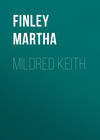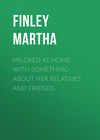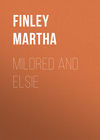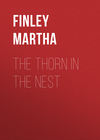Czytaj książkę: «Mildred Keith», strona 7
Chapter Thirteenth
"'Tis with our judgments as our watches, none
Go just alike, yet each believes his own."
– Pope.
"You hain't returned more'n our fust call; and then you didn't stay but ten minutes," Rhoda Jane said in a half-offended tone, to Mildred, "And we're such near neighbors too; we'd ought to be real sociable."
Mildred apologized by stating the fact that her time was very fully occupied.
"Well you and Claudina Chetwood seems to be pretty thick. But the Chetwoods is richer'n we are, an' I s'pose that makes it easier to find time to visit with 'em."
"The riches don't make any difference," said Mildred, flushing; "and I've heard that the Chetwoods are not very rich."
"Well, they hold their heads high anyway.
"I'm agoin' to have a rag carpet party pretty soon, and give you an invite, and if you don't come I'll be so mad I won't never come near you again."
"Perhaps I may be sick," sighed Mildred, half hoping in her secret heart that so it might fall out.
"Oh, then of course I couldn't be mad; but I'll try to fix it when you're well."
"When is it to be? and what is it like?"
"Soon's mother and me gits the rags all cut; 'bout a week from now, I reckon. Why a passel o' girls gits together and sews the rags and winds 'em up into balls, and after awhile the boys come in and then we have lots o' fun and good things to eat. Now I must run home. Good-bye, mind you're to be sure to come."
This was Friday. On the ensuing Monday morning little Ada set out sorrowfully for Miss Drybread's school, in company with Emmaretta and Minerva Lightcap.
Mildred was alone in the parlor when the child came back at noon.
"Well, pussy, how did you like it?" she asked with a sympathetic smile.
"Not at all. O Mildred, she isn't a lady or a Christian; for she deceives; she acts lies; she made a naughty girl believe she was going to roast her to death. There's a stove and a big oven in it; and she said she was going to put her in there and build up a hot fire and cook her."
"Did the girl believe it?"
"Yes; she was dreadfully frightened; she screamed like everything and promised that indeed, and indeed she'd be good; and Miss Drybread let her go to her seat."
"That was acting a lie and telling one too; and anybody who would do so, is unfit to have the care of children," said Mildred. "I shall tell father and mother about it, and I'm very sure they won't send you any longer than this one quarter anyhow."
"Mildred, she doesn't look like a lady either; she doesn't wear anything white round her neck; just a pink calico cape and an apron of the same, and another kind of calico dress."
"No matter about that if she only acted and talked right. She's neat and clean, I suppose?"
"Yes; I didn't see any soil on her clothes."
"Well, learn your lessons well and behave nicely, so that she can't find any excuse for ill treating you."
Mildred looked upon the expected carpet rag party with nearly as great aversion as Ada felt for her new school, but was a good deal relieved on learning from Claudina Chetwood that she, too, had been notified of its approach and expected to attend.
"I didn't know that you visited the Lightcaps," said Mildred.
"Oh, yes; they are not cultivated people, or very refined; but they're clever folks and kind neighbors; especially in times of sickness; and would feel dreadfully hurt if one should decline their invitations. They're not the sort of people we exchange formal calls with; indeed they never make them; but, as mother says, while society here is in the crude state it is now, it will not do to insist upon making associates of those only who are congenial."
"Or quite belong to our station in life?"
"Yes; we can not divide up into many circles, and must be willing to mix to some extent, with all who can lay claim to respectability and moral worth."
"I'm afraid I'm very proud," said Mildred laughing and blushing. "I've never been used to associating with any one so rough and uncouth, and it goes a good deal against the grain."
"Perhaps it isn't exactly pride," suggested Claudina; "they offend your taste; they do mine, I know; but surely we can bear that rather than give them the pain of thinking that we despise them."
"Yes, indeed," assented Mildred heartily; and from that moment ceased to allow herself to hope that something would occur to give her a plausible excuse for staying away from Rhoda Jane's merry-making.
She repeated Claudina's remarks to her mother and aunt and found that they fully approved of the sentiments she had expressed.
"Time was when I should have been very unwilling to see you consort with that class on terms of equality," said Mrs. Keith, "but circumstances alter cases."
The invitation came for Friday afternoon and evening; Rhoda Jane hailing Rupert as he passed and sending it through him.
Mildred was nearly in her usual health and accepted without a demur; but puzzled to know what to wear, and at what hour to go, went to Claudina for instruction on these important points.
"We are invited to work, you know," said Miss Chetwood, laughing, "so will be expected early; we should not be later than one o'clock, I think, and as it is not very nice work – carpet rags being apt to be dusty – we should not wear anything that will not wash. I shall put on a calico dress and carry a big work apron with me."
"Then I shall do the same."
"I wish you would; for there will be some girls there who haven't the means to dress and would feel badly if you or I outshone them very much."
"I can't go before three, or half-past, though; on account of having to recite to Mr. Lord."
"Never mind; I daresay it's just as well; for you'll get quite enough of both the work and the company."
Following out the instructions received, Mildred attired herself for the occasion with the utmost simplicity; but could not lay aside her delicate prettiness or a certain air of culture and refinement that made her more the real lady in her calico, than almost any of her companions of the afternoon would have been in the richest silk or velvet.
Just as she was ready to go, Ada came in from school, crying heartily.
"What's the matter?" asked Mildred, meeting her on the threshold and turning back full of sympathy.
"I – I've lost my place in the spelling-class," sobbed the child, "and I didn't miss a word either. You know I got up head the first day, and I've kept there ever since – 'way above all those big, big girls, some of 'em as big as you, Milly."
"But how did you get down if you didn't miss? was it for bad behavior?"
"No; but she upset the class and made us all draw lots for our places, and the one I drew made my place next to the foot."
"Mother, do you hear that?" asked Mildred, hotly; for anything like abuse or unjust treatment of her little brothers or sisters was sure to rouse her ire.
"Yes," Mrs. Keith said, "but Ada, you like the fun of getting up in your class, and you could never have that if you were always at the head."
This seemed a new idea to the child, and she smiled faintly through her tears.
But the wound was so deep it must bleed awhile, and the briny drops fell fast again.
She was an uncommonly good speller for a child of her age, and had taken great pride in keeping her place, working very hard to be able to do so; and this sudden, unexpected downfall, due to no failure on her part, almost overwhelmed her with a sense of loss, humiliation and injustice.
Mildred waited; she couldn't bear to go and leave Ada in such distress.
"Don't cry," she said, stroking her hair caressingly while the mother wiped away the fast flowing tears with her own soft white handkerchief, and kissed the flushed cheek, "don't cry, you'll soon get up again."
"And I shall write a note to Miss Drybread, telling her that I cannot approve of drawing lots to decide so trivial a matter;" said Mrs. Keith. "It seems to me very wrong; because it is an appeal to God. 'The lot is cast into the lap; but the whole disposing thereof is of the Lord!' It might be well enough to turn the class round occasionally, or in some other way to give the poor scholars a chance to rise; but this proceeding I so highly disapprove of that I shall not allow you to take part in it again."
"I wish you'd take me away out of her school, mother, oh do," pleaded the little girl.
"You shall not be kept there long," Mrs. Keith said. "But Mildred, child," she added gayly, "you must hurry away or I fear you'll not earn your supper."
A dozen maidens, mostly under twenty years of age, were collected in "the front room" at Mr. Lightcap's. A large clothes basket filled with many colored rags, torn or cut into strips of various lengths, occupied a conspicuous place upon the floor.
A number of girls were grouped about it and armed with needles and thread, scissors and thimbles, were busily engaged picking out the strips, sewing the ends together and winding the long strings thus formed, into balls; others had filled their laps and seated themselves here and there about the room.
They seemed a very merry company, laughing and chatting as they worked.
"Oh, how d'ye do?" said Rhoda Jane, catching sight of Mildred as she drew near the door, which was standing open; "thought you wasn't comin' at all. Walk right in. Let me take your sunbonnet. Here's a seat for you 'long side of Miss Chetwood. Guess you're better acquainted with her than any body else, without it's Viny Apple.
"Ladies, this is Miss Keith."
"I don't need no hintroduction," laughed Miss Apple. "'Ope you're well, Miss Milly."
The others looked up with a nod and a murmured word or two, as Rhoda Jane named each in turn; then they seemed to take up the thread of their discourse where it had been dropped, while Mildred tied on her apron, took the chair assigned her, threaded a needle, and helping herself, by invitation, from Claudina's lap, began her first ball, at the same time explaining that her lessons had detained her.
"You must be goin' to be dreadful learned," commented Rhoda Jane, filling Mildred's lap from the basket, "I wouldn't be you for something. I hate books and always did."
"Are we all here now?" asked some one.
"All but Damaris Drybread. She's oldish for the rest of us, but she's the schoolma'am, you know, and likes to be invited. And though she's late comin' – yonder she is now – she works dreadful fast when she does get at it."
Mildred overheard a whisper not complimentary to the coming woman,
"Pshaw! I wish she hadn't been asked. She spoils everything; for she's as solemn as a funeral and 'pears to think it's a sin to laugh."
"Yes," assented another voice, "that's so! and she never forgets that she's a schoolma'am; but takes it upon herself to tell you your duty without waiting to be invited to."
But now Miss Drybread was upon the threshold.
"Good evening," she said, in solemn tone and with a stiff little bow, addressing her salutation to the company in general; then giving her sunbonnet to Rhoda Jane, she seated herself in her usual bolt upright manner and fell to work.
Her presence acted as a damper upon the spirits of the younger portion of the party. A dead silence succeeded the merry chatter and laughter of a moment before.
Mildred had cared little for that while it went on, but it vexed her now that this woman, for whom, principally on Ada's account, she began to feel a decided dislike, should have it in her power thus to spoil the enjoyment of others; and she determined that it should not be.
Raising her voice that all might hear, she told an amusing anecdote that set everybody to laughing except the "schoolma'am," whose increasing solemnity of aspect seemed to reprove their levity.
"Oh, that was first-rate! do tell us another," cried Rhoda Jane, holding her sides. "I had no idea you could be so funny."
Mildred went on with anecdotes, jests, conundrums, Claudina and one or two others contributing their quota also, till with the ruder ones the mirth became somewhat boisterous.
As it died down again, Miss Drybread spoke.
"Life, permit me to observe to you all, is too serious and solemn to be spent in laughing and joking. Allow me to say, Miss Keith, that I am astonished that you, a church member, should indulge in such frivolity."
"Do you think a Christian should always wear a long face, ma'am?" asked Mildred, saucily, her tell-tale countenance showing all too plainly the contempt and aversion she felt for her self-constituted censor.
"Yes; I think that folks that profess that they've got religion ought to be grave and sober, and let the world see that they don't belong to it."
"As if there was any harm in innocent mirth!" exclaimed Mildred, "as if there was anybody in the world with so good a right to be glad and happy as one who knows that Jesus loves him! 'Rejoice in the Lord, ye righteous and shout for joy all ye that are upright in heart,' The Bible is full of commands to God's people to rejoice, to be glad, to sing for joy; and the best Christians I know seem to me the happiest people on earth."
"You're rather young to set up your judgment as to who's the best Christian and who's got religion and who hasn't," returned the spinster bridling.
"Well, none o' your long-faced, sour-looking Christians for me!" exclaimed Rhoda Jane, "I'd never want to get religion till the last minute, if I wasn't to be 'lowed to laugh and joke no more."
"I can not read the heart, nor can any other human creature," said Mildred, replying to Miss Drybread's last remark; "but Jesus says, 'By their fruits ye shall know them.' 'He that keepeth my commandments he it is that loveth me;' and when you live with people and see them constantly serving God with gladness, walking in his ways, rejoicing in his love, making the Bible always their rule of faith and practice, showing far more solicitude about heavenly than about earthly things, both for themselves and their children, I think you may be very sure they are real Christians."
"I think so too!" said Claudina emphatically.
"So do I," "and I," chimed in several other voices, "but do you know any such folks?"
"I have been describing my father and mother," Mildred said. "And my dear Aunt Wealthy too."
"That's a fact," spoke up Viny. "You 'ave to live with folks to find 'em out, and I've lived there and I never seen better Christians; they don't keep their religion for Sundays, but Mr. Keith 'e reads in the good book hevery night and mornin' and prays just like a minister – honly not so long – and they sing 'ymns. And I never 'eard a cross word pass between Mr. and Mrs. Keith – or Mrs. Stan'ope heither, and they never threaten the children they'll do something hawful like breakin' their bones or skinnin' of 'em alive, has some folks does; but just speaks to 'em quiet like, sayin' exactly what they mean: and they're always minded too."
Chapter Fourteenth
"Jest and youthful jollity,
Quips and cranks and wanton wiles,
Nods and becks and wreathed smiles."
"There had better be less talk, if these rags are all to be sewed to-day," remarked Miss Drybread, taking a fresh supply from the basket, then straightening herself till she was, if possible, more erect than before.
"I can talk and work too; my needle haint stopped because my tongue was runnin'," retorted Viny; "and it strikes me you've been doin' your share as well's the rest."
"My second ball's done," said Claudina, tossing it up.
"A good big one too, and wound real tight," said Rhoda Jane taking it, giving it a squeeze, then rolling it into a corner where quite a pile had collected.
"How quick you are, Claudina," said Mildred.
"Not so very; I've been at it quite a good while. Some folks can pretty nearly make two to my one." And she glanced toward Miss Drybread who was just beginning to wind her second.
"But 'tain't everybody that winds em as good and solid as you do, Claudina," said another girl significantly; "windin' loose can make a ball grow fast, I tell you!"
"'All is not gold that glitters,'" quoted Mildred.
"I'd begin to wind if I were you," said Claudina, "you have quite a pile there and it might get into a tangle."
"Thank you. I'm new to the business," said Mildred laughing, "and shall take the advice of an older hand."
"Supper's ready," announced Minerva, opening the kitchen door.
"Put down your rags and walk right out, ladies," said Rhoda Jane.
"It seems to me that I, for one, need some preparation," said Mildred, dropping hers and looking at her hands.
"Oh yes, we'll wash out here," said Rhoda Jane, leading the way.
A tin bucket full of water, a dipper and washbasin, all bright from a recent scouring, stood on a bench in the shed at the outer kitchen door; a piece of brown soap lay there also, and a clean crash towel hung on a nail in the wall close by.
The girls used these in turn, laughing and chatting merrily the while, then gathered about the table, which was bountifully spread with good plain country fare – chicken, ham, dried beef, pickles, tomatoes, cucumbers and radishes, cheese, eggs, pie, cake and preserves, in several varieties, hot cakes and cold bread, tea and coffee.
None of the family partook with their guests except Rhoda Jane; they would eat afterwards; and Mrs. Lightcap busied herself now in waiting upon the table; filling the tea and coffee cups in the shed where the cooking stove stood during the months of the year when its heat was objectionable in the house.
"I don't know as we've earned our supper, Mis' Lightcap," remarked one of the girls, stirring her tea; "we hain't begun to git all them rags sewed up yet."
"Well, then, I'll just set you to work again as soon as you're done eatin'; that'll do just as well; folks don't always pay in advance, you know."
"And if we don't get through 'fore the boys come we'll make them help," said Rhoda Jane.
"What boys?" queried Mildred; whereat several of the girls giggled.
"Why the fellows, of course," laughed Miss Lightcap; "the boys is what we mostly call 'em; though some of 'em's pretty old, I should judge, for that."
"Yes, there's Rocap Stubblefield, must be thirty at least," said one.
"And Nick Ransquattle's twenty-five if he's a day," remarked another.
"Well, the rest's young enough," said Mrs. Lightcap. "Pass that cake there, Rhoda Jane. There's my Gotobed just turned twenty-one, and York Mocker, and Wallace Ormsby, and Claudina's brother Will's all younger by some months or a year or so."
The meal concluded, the work went on quite briskly again, Mildred catching now and then a whispered word or two about the desirableness of getting through with it in time to have some fun; but the raw material for several more balls still remained in the basket when "the boys" began to come.
Gotobed was naturally among the first. He was quite "slicked up," as Rhoda Jane elegantly expressed it, though his toilet had been made under difficulties.
The only legitimate way of reaching the second story and his Sunday clothes, was by a stairway leading up from the front room, where the girls were.
The windows of his bedroom, however, looked out upon the leanto which formed the kitchen part of the building and whose roof was not many feet higher than that of the shed.
Watching his opportunity for doing so unseen, he climbed upon the shed, gained the roof of the leanto, and entered his room by the window.
There was nothing of the dandy about the honest fellow, yet somehow dressing was a slow business with him to-night; he stood before a little square of looking-glass hanging on the wall, tying and retying his cravat till it was too dark to see, then giving up in sheer despair went down over the roof as he had come, and sought his mother, who, with the help of Emmaretta and Minerva, was washing dishes in the kitchen.
"My land!" she exclaimed, as he came in, "what a time you've been up there. I never knowed you to take half as long to dress afore."
"My fingers are all thumbs," he said, a hot flush overspreading his sunburnt face, "I can't tie this decent nohow at all."
"Well, just wait till I can wipe my hands, and I'll do it. There, that'll do; the girls ain't agoin' to look partickler hard at that bit o' black ribbing."
"Maybe not, but I'm obleeged to you all the same for fixin' it right. Is it time to go in?"
"Of course, if you want to."
He passed out at the back door and through the yard into the street. He was bashful and did not like to face such a bevy of girls alone; at the thought of addressing one of their number in especial – Mildred Keith – he felt himself grow hot and uncomfortable. He had been admiring her from a distance all these weeks, but had never met her, and much as he desired an acquaintance, his courage seemed hardly equal to seeking it now.
How rough and boorish, how awkward and ill-bred he would appear to one so delicate and refined.
He waited about a little, till joined by a fellow mechanic, Nicholas Ransquattle, when they went in together.
This was a wiser step than Gotobed knew; for his well-made, stalwart figure showed to good advantage beside that of Nicholas, who was short and thick-set, had scarcely any neck, moved like a wooden man, and carried his head thrown back on his shoulders; he had a wooden face, too; large featured and stolid in expression.
But he was not troubled with bashfulness or any fear that his society would be other than most acceptable to any one upon whom he might see fit to bestow it.
"Good evening, ladies; I'm happy to meet you all," he said, making a sweeping bow to the company as he entered, hat in hand. "And I hope I see you well."
"Good evening," responded several voices. "Good-evening, Mr. Lightcap."
"Find yourselves seats and we'll give you employment, threading our needles for us."
Rhoda Jane was snuffing the candles. Hastily laying down her snuffers, she introduced the young men to Mildred, and dexterously managed to seat Ransquattle on the farther side of the room, leaving the field clear for her brother; for an empty chair stood invitingly at Miss Keith's side.
Gotobed took it, and, almost wondering at his own audacity, addressed his divinity with a remark upon the weather – that never-failing resource when all other topics elude us.
She answered with gracious sweetness,
"Yes it has been a lovely day, Mr. Lightcap."
What should he say next.
"I – I guess you never sewed carpet rags afore?"
"Is it my awkwardness at the business that makes you think so?" she returned, with a quizzical look and smile, as she lifted her fine eyes to his face.
"No, no, no sirree! ma'am, I mean," he stammered growing red and hot; "you do it beautiful!"
"Let me give you some work," she said, taking pity on his embarrassment; "will you thread this needle for me?"
"And then mine, please," put in Claudina, who was again seated near her friend; then to his further relief she launched out into a reminiscence of a candy pulling they had both attended the year before.
Others of "the boys" came flocking in, the work was speedily finished, there was some tossing back and forth of the balls, amid rather uproarious laughter; but some of them unwound and became entangled; and so that sport was given up; the girls washed their hands as before supper; Blindman's Buff, Puss in the Corner and other games were played with as much zest as if the players had been a parcel of children; then refreshments followed, served up in the kitchen; huckleberries with cream and sugar, watermelons, and muskmelons, doughnuts and cup cake.
At eleven o'clock the party broke up and the young men saw the girls safely home, Gotobed being so fortunate as to secure the privilege of waiting upon Mildred to her father's door.
She would, perhaps, have slightly preferred the attentions of Yorke Mocker, or Wallace Ormsby; both of whom she had met before and who were young men of much better education and much more polish and refinement than poor Gotobed.
It was Mrs. Keith who admitted her daughter; every one else in the house having retired.
"Had you a pleasant time?" she asked, with a motherly smile.
"I heard some of the others, as they went away, saying it had been perfectly splendid," Mildred answered with an amused little laugh, "but the fun was of rather too rough a sort for me."
"Games?"
"Yes, ma'am; and I took part until they began kissing; when I retired to the ranks of the spectators."
"That was right," Mrs. Keith said emphatically.
"And what do you think, mother?" laughed Mildred. "Viny Apple was one of the guests. The idea of being invited out to meet your ci-devant housemaid and cook! isn't it too funny?"
"Well, dear, let us be thankful that Celestine Ann was not invited also; leaving me to get tea to-night," Mrs. Keith said, joining in the laugh.




















